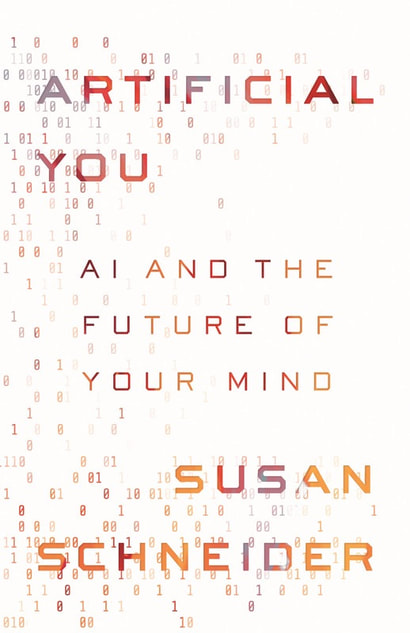|
Click here for the introduction
Order on Amazon Video of Schneider's Harvard keynote on Artificial You. Podcast interview on the book. Reviews This riveting book is both entertaining and profound: it offers a humane perspective on AI, a topic that has attracted too much naive hype and scaremongering. Classic philosophical problems of the self, the mind, and consciousness will soon―through transformative advances in AI―become crucial to practical ethics and individual choices. Schneider offers sophisticated insights on what is perhaps the number one long-term challenge confronting humanity."―Martin Rees, Astronomer Royal, author of On the Future "Is artificial consciousness possible? Could you become an AI? Would you still be you? Schneider makes a vivid and compelling case that the future of humanity may depend on the answers to these philosophical questions. Artificial You is brimming with useful tools for thinking about the mind and its future."—David J. Chalmers, author of The Conscious Mind: In Search of a Fundamental Theory "AI, metaphysics, and the future of life in the universe—Schneider writes about the biggest issues of our time with an engagingly light touch, and enviable insight and clarity. Highly recommended."--—Huw Price, academic director of the Leverhulme Centre for the Future of Intelligence and co-founder of the Centre for the Study of Existential Risk What’s it take to have a mind and to be a conscious being? Could an AI have a mind? Could it have a conscious mind? Might the best plan be to merge with our best AI’s? Schneider’s book is a smart, bite-sized tour de force of the state of play in philosophy and science. Before you head to the Centre for Mind Design for your next upgrade, read this book. –Andy Clark, author of Supersizing the Mind and Natural-Born Cyborgs A fascinating exploration of human-level AI and brain enhancement, combined with a passionate argument for the importance of philosophy in understanding what on Earth we are doing when we pursue these lines of research. –Stuart Russell, author of Human Compatible: Artificial Intelligence and the Problem of Control.―Stuart Russell, author of Artificial Intelligence: a Modern Approach "This timely and exciting book explores issues at the intersection of philosophy of mind and philosophy of technology. Cautiously optimistic about transhumanism and conscious artificial intelligence, Schneider articulates an interesting, coherent perspective. I know of no other book that combines such a high level of quality and accessibility on these topics. Artificial You is terrific.""―Eric Schwitzgebel, University of California, Riverside Schneider’s Artificial You offers a provocative mix of transhumanist aspirations, philosophical reflections, and vivid thought experiments that probe the unknown intersections of human and machine intelligence, consciousness, and identity." –Shannon Vallor, author of Technology and the Virtues: A Philosophical Guide to a Future Worth Wanting "Fun, clear, engaging, Artificial You introduces readers to cutting-edge work in issues of the mind, artificial intelligence, free will, and the possibility of enhancing ourselves with technology. Connecting research in robotics and AI with traditional discussions of personal identity and consciousness, Schneider treats topics fairly and plausibly and contributes important insights.""―Michael Huemer, University of Colorado, Boulder |
A sober-minded philosophical exploration of what AI can and cannot achieve
Humans may not be Earth’s most intelligent species for much longer: the world chess, Go, and Jeopardy!champions are now all AIs. Given the rapid pace of progress in AI, many predict that AI could advance to human-level intelligence within the next several decades. From there, it could quickly outpace human intelligence. What do these developments mean for the future of the mind? In Artificial You, Susan Schneider urges that it is inevitable that AI will take intelligence in new directions, but it is up to us to carve out a sensible path forward. As AI technology turns inward, reshaping the brain, as well as outward, potentially creating machine minds, it is crucial to beware. Homo sapiens, as mind designers, will be playing with “tools” they do not understand how to use: the self, the mind, and consciousness. Schneider argues that an insufficient grasp of the nature of self, consciousness, and mind could undermine the use of AI and brain enhancement technology, bringing about the demise or suffering of conscious beings. To flourish, we must grasp the philosophical issues lying beneath the algorithms. At the heart of her exploration is a sober-minded discussion of what AI can truly achieve: Can robots really be conscious? Can we merge with AI, as tech leaders like Elon Musk and Ray Kurzweil, suggest? Is your mind just a program? Examining these thorny issues, Schneider proposes ways we can test for machine consciousness, questions whether consciousness is an unavoidable byproduct of sophisticated intelligence, and considers the overall dangers of creating machine minds. |
